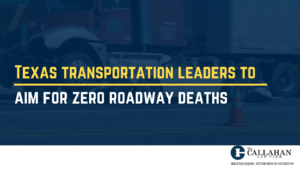Texas Transportation Leaders to Aim for Zero Roadway Deaths

Though it might seem impossible and likely is, Texas transportation leaders have set the lofty goal of zero roadway deaths by 2050. If all goes according to pan, roadway deaths in the Lone Star state will be cut in half by 2035. The question is how, exactly, will this remarkable feat be achieved? The “how” of the matter will be determined in the upcoming years as state officials attempt to reduce roadway crashes in what has become the deadliest highway system in the United States.
The Numbers
At the moment, Texas has around 3,900 roadway deaths every single year. If the state’s transportation leaders actually meet their goal of reducing roadway deaths by 50% in the next 15 years, this death total will decline to about 1,950. It is hard to believe the numbers will go any lower than that unless autonomous vehicles comprise the vast majority of cars on the roads in 2035. It is even harder to believe the state will have zero roadway deaths by the time 2050 rolls around. However, the willingness to set such a goal makes it clear that even a single death on Texas roadways is completely unacceptable.
Why Roadway Deaths are Such a big Deal in Texas
Texas leads the country in traffic deaths as well as serious injuries. This is precisely why state politicians, nonprofit leaders and others are shooting to bring the state’s roadway deaths down to zero by the halfway point of the century. If the bulk of auto collisions can be prevented, fatalities will decrease in unison. A number of strategies will have to be developed and implemented in order for there to be zero roadway deaths by 2050 or any other point in the future.
How to Improve Roadway Safety in Texas
Roadway safety is centered on the “three Es”: education, enforcement and engineering. Ideally, roadway and highway designs will mitigate risk by providing drivers with that much more space and roads that are as straight as possible. Politicians and other community leaders have hesitated to widen lanes as conventional logic states that more space will cause drivers to drive that much faster.
Though enhancing road designs, boosting traffic law enforcement and enhancing driver education will certainly help, it will not be possible to reduce roadway deaths to zero at any point soon. Rather, the state is likely to implement targets in a staggered manner in accordance with anticipated population growth. It will take a concerted and well-organized effort to put an end to roadway fatalities as the state’s population continues to grow. Sadly, academicians at the Texas A&M Transportation Institute predict there will be more than 4,000 roadway fatalities in Texas in the year 2022.
There is Reason for Optimism
Though no state has reduced its roadway deaths all the way down to zero, some cities have had success after enhancing the engineering, education and enforcement as detailed above. As an example, New York City implemented bike lane projects that slowed the pace of traffic on city streets resulting in the least number of pedestrian fatalities on the city’s roads in its entire history. Chicago and Los Angeles have also successfully slowed their streets, added biking lanes and subsequently reduced roadway injuries and deaths by a considerable margin.
Injured on the Road? We are Here to Help
An accident on the road will cause much more hardship than physical pain. Those injured while driving, riding or walking ultimately face myriad pains, be it in the form of a hit to personal finances, lost time at work, the loss of use of a limb and/or suffering, mental anguish, etc. Our accident attorneys are here to zealously advocate on your behalf in and out of court. Contact us today to get the ball rolling on your personal injury case.

Michael S Callahan is an attorney and founder of The Callahan Law Firm. He focuses his practice on representing individuals and families in personal injury cases involving motor vehicle and truck accidents, workplace accidents and defective products. With over 25 years of experience, he is dedicated to fighting on behalf of people whose lives have been forever altered by the negligence and carelessness of corporations and individuals. Originally trained as a mechanical engineer, Michael has been practicing law and fighting for justice for those who need it most since 1994. He is board-certified in Personal Injury Trial Law by the Texas Board of Legal Specialization and a member of various esteemed legal associations. Outside of work, Michael enjoys spending quality time with his family, outdoor activities, and continually striving to improve as a trial lawyer and human being.











